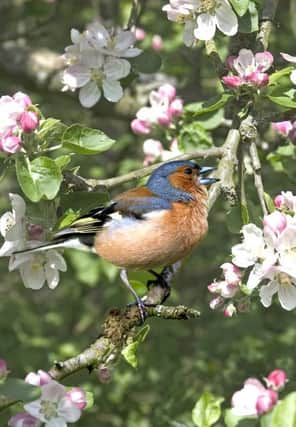Wake up early to catch the dawn chorus


Male birds are jostling to prove their worthiness to potential mates and declare their territories.
Singing uses a lot of a bird’s energy, so the louder and stronger his song, the better potential mate he is.
Advertisement
Hide AdAdvertisement
Hide AdThe most successful ones will convince and pair up with their mates in the spring, and can even produce two broods by the summer.
Some birds even leave gaps in their songs to locate their rivals, and learn to mimic others’ calls to create the impression of an already contested territory in order to secure their patch.
Different birds pipe up as the morning progresses, making it a real treat.
The earliest risers are our resident male blackbirds, robins and nightingales, filling the air with their song.
Advertisement
Hide AdAdvertisement
Hide AdThey tend to have relatively large eyes compared to their body size, so are able to begin foraging for food (mainly worms) earlier than other species.
They’re soon joined by wrens and our summer migrants like chiffchaffs and blackcaps.
They can’t forage as early as the first singers because of their smaller eyes, but they still sing in time for them to be able to hunt insects and spiders once its light enough.
Finally chaffinches, goldfinches and sparrows round off the performance at the end.
Advertisement
Hide AdAdvertisement
Hide AdAs seed eaters, they need brighter light before they can begin foraging.
Once the sun has risen, it’s too risky for songbirds to be advertising their position to predators, so our tired and hungry feathered friends move on to find food for the day, after a job well done.
Catching the dawn chorus means an early start – with birds waking up and raising their voices just before, during and just after sunrise.
Recent research has suggested that birds are shifting their efforts earlier to avoid being drowned out by man-made noise.
Advertisement
Hide AdAdvertisement
Hide AdSimilarly there’s been some suggestion that light pollution mimics dawn, and means birds are beginning earlier.
Find somewhere that’s relatively quiet and home to lots of woodland birds, such as the Wildlife Trust’s Swanwick Lakes Nature Reserve.
Swanwick Lakes includes scenic lakes and a peaceful wooded landscape of more than 35 hectares.
It’s a great place to see and hear a range of birds, including goldfinches and woodpeckers.
Advertisement
Hide AdAdvertisement
Hide AdThe first birds begin to sing about an hour before sunrise, when they’re least likely to be spotted by predators. Ideal days are those with the best weather.
As well as being more comfortable for you the audience, dry clear and calm mornings mean you’ll be able to hear the performers better.
Thanks to the often still weather at dawn, and lack of noise from traffic and other activity, bird song carries up to 20 times as far than at midday.
Go to hiwwt.org.uk.